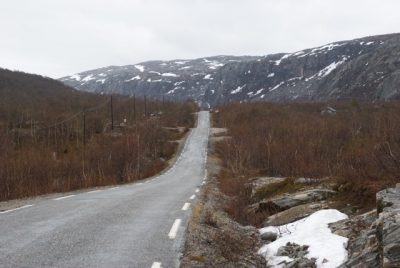The conservative Norwegian government’s highly controversial regional reform program has been salvaged by the small Christian Democrats party. The Christian Democrats’ decision on Friday to support county mergers, including one between Finnmark and Troms, now gives the minority government enough votes in Parliament to continue to force the counties to team up.

“This is the most important reform and the biggest boost for outlying districts in modern times,” Kjell Ingolf Ropstad, deputy leader of the Christian Democrats, claimed at a press conference Monday afternoon. He and the three government party officials present all claimed that the reform would “move power out of Oslo to the areas where people live.”
Power will be transferred, he stressed, from the state to Norway’s 11 new counties, down from today’s 19. The new, bigger counties will also assume responsibility by January 1, 2020 for a wide range of new functions currently handled by the state. The state government will unveil exactly which functions will be transferred next month.
The three parties making up Norway’s minority conservative coalition were jubilant. The Liberals called it a reform that will boost local democracy, while the Progress Party hailed the mergers as a means of “decentralizing” and making delivery of services more efficient. The Conservatives, who’ve been leading the reform effort, were mostly relieved that it now has the authority, thanks to the Christian, to carry out an important part of its reform program.
Plans to have “fewer and stronger” counties can now proceed, after Finnmark’s massive resistance to a forced merger with Troms threatened to derail the reform program nationwide. The merger of Norway’s two most northern counties, with the smallest population spread over the biggest geographical area, was hotly contested in Finnmark, where more than 80 percent of the local population voted against it in a referendum last spring. They fear a loss of identity and that decisions in their case will now not be made in Finnmark’s own towns like Vadsø and Alta, but far to the west in Tromsø.
The Finnmark and Troms merger process thus stalled, leading three counties in Norway’s far more populous southern region to question why they should be forced to merge. There’s also been strong resistance to the merger of Akershus, Buskerud and Østfold into one large new county called Viken, which will cover a large area from the mountains to coastal areas along the fjord with around 1.2 million people.
The state officials claim it’s all part of decentralization, while those forced to merge view it quite differently. In the case of Viken, for example, the new merged county’s administration is likely to be placed in Sandvika, just outside Oslo itself. Norway in general also has a long history of resisting threats to local identity.
The Center Party, which usually promotes decentralization and the transfer of more power and resources to outlying areas, claims the regional reform is “the biggest centralization measure we’ve ever seen in Norway.” Center Party leader Trygve Slagsvold Vedum has backed Finnmark’s efforts to resist its forced merger with Troms. He also supported the uproar in other counties. Only the two Trøndelag counties, North- and South, have so far merged relatively peacefully.
“The government and the Christian Democrats have decided to not care about the people’s opposition to this,” Vedum said on Monday. “They’re ignoring the the referendum (in Finnmark). The people have been overlooked and mowed over.” He further claimed that the government and the Christian Democrats were showing “an enormous arrogance.”
Now the rebellions in both Finnmark and the Viken counties seems to have been halted, however, with the Christian Democrats’ decision to back the three government parties. Its youth group also voted over the weekend to encourage the Christian Democrats to simply join Prime Minister Erna Solberg’s government, and give it an internally negotiated majority on most all issues.
Monica Mæland, the embattled Conservatives minister in charge of carrying out the mergers, claimed they must now all move forward, with the new counties in place by January 1, 2020. If Finnmark continues to refuse to participate, Mæland will appoint people who will.
newsinenglish.no/Nina Berglund

